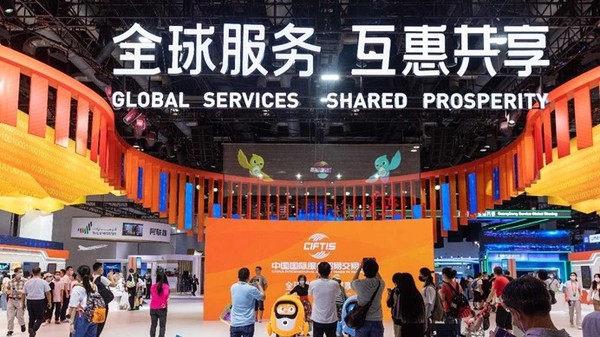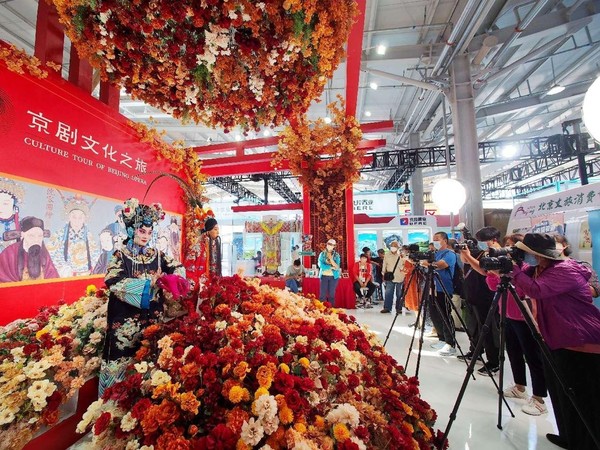By Li Dawei
China has demonstrated its firm support for trade liberalization and economic globalization by forging many platforms for opening up and cooperation, including the China International Fair for Trade in Services (CIFTIS) and the China International Import Expo (CIIE).
The successful hosting of events such as the CIFTIS and the CIIE in recent years has strongly promoted connectivity and sharing of elements and resources between domestic and international markets, showing China's unswerving commitment to expanding opening up.

Major exhibitions offer important platforms for enterprises across countries to showcase quality products and services. This can lower transaction costs between businesses and address information gaps, thereby facilitating economic and trade cooperation.
Despite myriad challenges, China successfully hosted a series of major international exhibitions including the CIFTIS and the CIIE, amid the pandemic.

This fully reflects the country's adherence to the concept of committing itself to openness to meet development challenges, foster synergy for cooperation, build the momentum of innovation, and deliver benefits to all.
Most importantly, China underscores imports at these exhibitions, highlighting its allegiance to the concept of mutual benefit and win-win cooperation through expanding opening-up and turning the enormous domestic market into enormous opportunities for the world.

These platforms have become vital channels for exporters globally to access the Chinese market, explore investment and partnership opportunities, and gain insights into China's economic development.
They are evolving into venues for launching new products worldwide, releasing cutting-edge technologies, and introducing groundbreaking services.
Platforms such as the CIFTIS and the CIIE have evolved into vital bridges and bonds linking China with the rest of the world, serving as comprehensive open platforms for sharing.
At the 2022 CIFTIS, 7 summit forums, along with over 100 specialized forums and industry conferences were convened. Throughout these events, business leaders and experts engaged in discussions on cutting-edge topics, sharing their latest perspectives and insights, and contributing their wisdom and commitment toward advancing global economic and trade growth.
The 2022 CIFTIS comprehensively showcased China's innovative accomplishments in trade in services, realizing a total of 1,339 deliverables.
The 5th CIIE saw the participation of 145 countries, regions and international organizations. During the event, 24 parallel sessions of the Hongqiao International Economic Forum were held. A total of $73.52 billion worth of tentative deals were reached for one-year purchases of goods and services during the 5th CIIE, up 3.9 percent from the 4th CIIE.
High-quality products from different countries, including rose essential oil made in Damask, Syria, Himalayan salt lamps from Pakistan and alpaca-fur products from Peru, as well as high-tech products such as AI-enabled cleaning robots and intelligent color toners, entered the Chinese market through the CIIE, providing diverse choices and improving user experiences for Chinese consumers.
Amid the uncertainties pervading the current international landscape, countries widely believe such open platforms inject certainty into China's pursuit of shared growth with the world.
These platforms assist China in deepening reforms, raising the quality of its opening-up efforts and upgrading domestic consumption and industries by aggregating top-tier goods, businesses, and resources globally.
They also enable more countries, especially developing ones, to further integrate into the global economy, promoting win-win cooperation.
The business exhibition at the 5th CIIE attracted over 2,800 enterprises from 127 countries and regions, including 284 Fortune 500 firms and industry leaders. This fully demonstrates CIIE's sterling reputation among the world's major corporate groups.
Countries including the UK and Malaysia are planning to send high-level delegations to participate in the 2023 CIFTIS.
Countries such as Germany, Uruguay, and Myanmar, as well as international organizations like the UNESCO and the World Meteorological Organization(WMO), will establish online and offline exhibitions under the name of their respective governments or headquarters.
Resuming offline for the first time since COVID-19, the National Exhibition at the upcoming 6th CIIE has already received confirmations of offline participation from over 50 countries and international organizations.
As China continues to share the substantial opportunities of its economic growth with the world, the global sway of high-profile exhibitions will keep expanding, infusing powerful impetus into the continued progression of economic globalization.
(Li Dawei is Director of the Emerging Economies Research Office, the Institute of International Economic Studies of the Chinese Academy of Macroeconomic Research)

